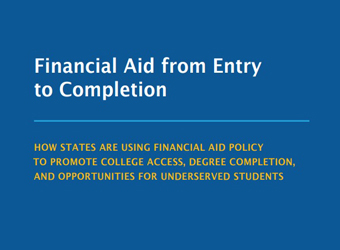A new report offers a survey of the national financial aid landscape while focusing on creative approaches to supporting students in seven states, including Florida.
Helios Education Foundation, in conjunction with non-partisan, non-profit research firm WestEd, recently published “Financial Aid from Entry to Completion: How States Are Using Financial Aid Policy to Promote College Access, Degree Completion, and Opportunities for Underserved Students.” The education brief highlights innovative strategies that have resulted in higher-than-average postsecondary degree completion with lower-than-average student debt.
The report explores challenges in three financial aid categories — overcoming barriers to financial access, facilitating degree-completion goals, and limiting student debt — by examining innovative strategies in Florida, Arizona, California, Georgia, Massachusetts, Oregon, and Texas.
With 40 Institutes of Higher Education (28 Florida College System schools and 12 State University System institutions), Florida serves nearly 1.1 million students across its public postsecondary sector. During the 2017-18 school year, Florida was the second least expensive state in the country ($6,360 in-state tuition and fees per student at public 4-year colleges) for earning a 4-year degree, trailing only Wyoming. Florida is also one of only three states to have achieved a net decline in average tuition and fees compared to five years ago. In addition, the community college system serves as the primary access point into higher education for most Floridians, with average in-state tuition and fees of $3,240 for 2017-18.
However, the brief also notes that Florida awarded a larger proportion of state financial aid based on merit (62%) rather than need (38%); by contrast, among all college students in the state, 53% are from low-income families based on Pell Grant receipt.
Statewide campaigns such as FCAN’s Florida FAFSA Challenge — which seeks to increase the proportion of high school seniors who complete the Free Application for Federal Student Aid — are praised in the report for both their statistical impact (Florida’s 9.8% boost in FAFSA completion during the 2016-17 school year was the third-highest year-to-year increase nationwide) and for inspiring other states to use data dashboards to promote FAFSA completion.
The report also highlights several programs and resources at Florida College System and State University System institutions.
Hillsborough Community College’s Academic Success Centers work with students struggling to keep their grades up — and who consequently risk losing their financial aid — by providing free tutoring and other assistance in a variety of subjects. HCC also implemented a college success program called Student Life Skills, which includes a series of courses designed to help students select, plan for, and complete a program of study.
Meanwhile, the University of South Florida has taken a case management approach to monitoring student persistence by using predictive analytics and cross-campus professional teams to identify and support at-risk students.
Additionally, Florida offers a First Generation Matching Grant (FGMG), a need-based grant program available to degree-seeking, resident, undergraduate students whose parents have not earned a bachelor’s degree. The award amount and eligibility criteria are set by participating institutions, which receive matching funds from the state to subsidize enrollment.
“It’s imperative that students find appropriate supports all along their education journey, from postsecondary access to completion,” said Paul J. Luna, Helios’ president and CEO, in a statement. “Support, particularly financial support, is critical to ensure more first-generation, minority, and underrepresented students complete a postsecondary degree.”
RELATED ARTICLES:

